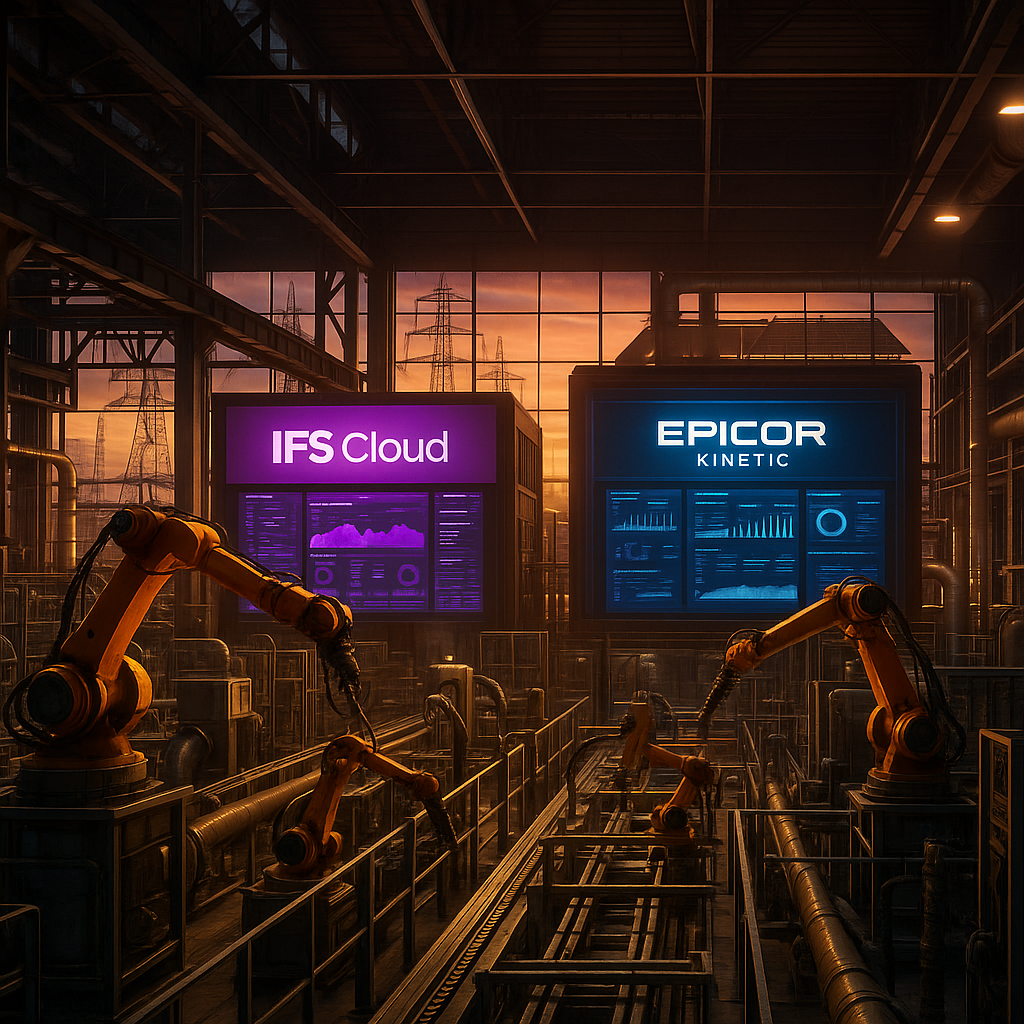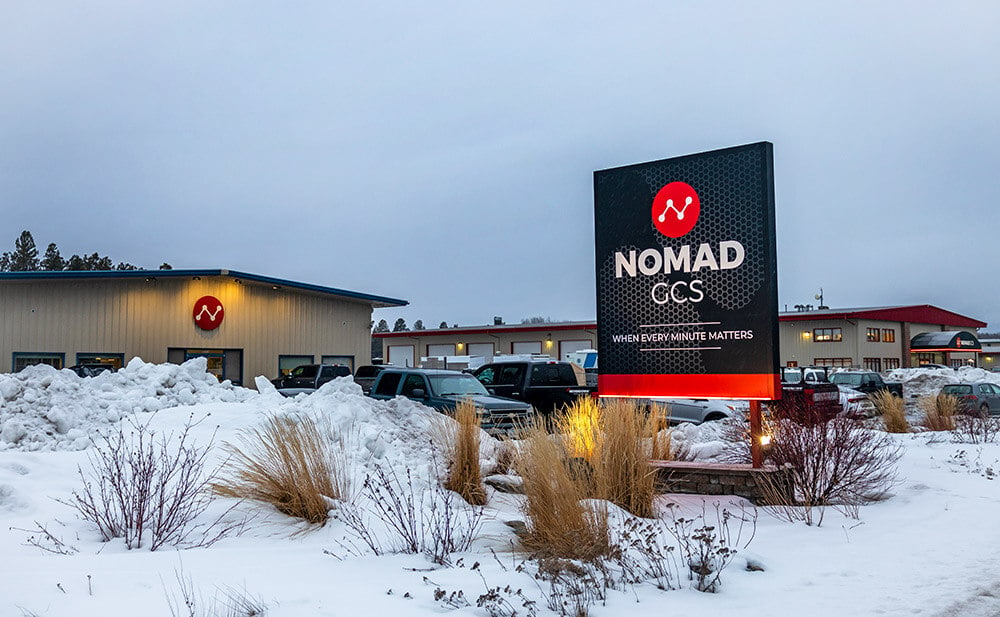1 min read
Top IFS ERP Features and How They Benefit Your Industry
Enterprise Resource Planning (ERP) has evolved from a back-office function into a central pillar of business strategy. Organizations across...
6 min read
 Blake Snider
:
Oct 15, 2025 1:00:00 PM
Blake Snider
:
Oct 15, 2025 1:00:00 PM
Project-based manufacturing runs on control, including scope, cost, and delivery. Without the right ERP, that control breaks down fast. Is your team managing WBS costs, change orders, and billing milestones in one system or across spreadsheets?
According to PwC's Data Day 2025 report, 82% of companies report improved decision support from data-driven ERP and analytics strategies. Yet for many ETO and MTO manufacturers, real-time visibility remains out of reach. This guide cuts through the noise, highlighting the features that matter and the vendors that actually fit project-based operations.
For engineer-to-order (ETO) and make-to-order (MTO) manufacturers, no two jobs are alike. You’re not running repeat production lines. You’re managing unique projects, each with its own scope, budget, and delivery milestones. That’s why traditional ERP systems designed for high-volume manufacturing often fail to deliver the visibility and control your teams need. If you're comparing options, explore our top ERP systems for manufacturing to see where each solution fits.
In make-to-stock environments, the product is standard, and the process is optimized for scale. In ETO and MTO, the product starts with a customer specification. Your engineering team designs it. Your supply chain finds custom parts. Your shop floor builds it once, maybe never again. This model requires an ERP that supports non-linear workflows, late-stage changes, and cost tracking at the project level.
In a project-based ERP, the work breakdown structure (WBS) replaces the product as the organizing principle. Labor, material, subcontract, and overhead are tracked through cost codes tied directly to each project. This structure supports everything from quoting and scheduling to billing and margin analysis.
Without integrated lifecycle visibility, project managers are left stitching together data from spreadsheets, emails, and siloed systems. That leads to missed deadlines, budget overruns, and billing delays. A true project-based ERP keeps scope, schedule, and cost in sync—helping you protect margin, meet customer expectations, and stay audit-ready.
Not all ERPs are built for project-based work. ETO and MTO manufacturers need more than inventory management and standard financials. The right solution must support WBS-driven execution, real-time costing, flexible billing, and constraint-based scheduling, all tied to the unique demands of project-based delivery.
A project-based ERP must structure all cost and progress data around the work breakdown structure. This includes labor hours, subcontractor spend, material usage, and indirect costs. Leading systems let you assign cost codes, track earned value, and forecast margins at the work-package level. Without this visibility, overruns are spotted too late.
Project scope often changes after kickoff. Your ERP should capture approved change orders and automatically reflect them in the BOM, routing, timeline, and cost baseline. Revision control ensures teams execute against the correct version and reduces the risk of rework or missed requirements, especially when multiple departments or external partners are involved.
Revenue recognition and billing for long-term contracts require accuracy and timing. A capable ERP must support progress billing, milestone triggers, retainage, and percent complete tracking. It also needs to comply with ASC 606, allocating revenue based on actual performance obligations met. If your ERP can’t handle this, finance teams are forced to reconcile manually, introducing errors and cash flow delays.
ETO and MTO schedules are dynamic. Material lead times vary. Resources shift. Advanced planning and scheduling (APS) helps align delivery promises with available capacity. The ERP should support constraint-based scheduling by work center, shift, and crew, while factoring in project deadlines. Without it, you risk late deliveries and idle labor.
When it comes to project-based ERP systems, IFS and Deltek Costpoint stand out, but for very different reasons. Understanding how each platform handles key manufacturing and accounting workflows will help determine which is right for your operation.
IFS is built for complex manufacturing environments that require deep operational control. It offers WBS-native costing, integrated project procurement, advanced planning and scheduling (APS), shop floor control, and field service management. These features make it a strong fit for discrete manufacturers handling engineer-to-order (ETO) or service-based project work.
Deltek Costpoint, on the other hand, is optimized for project accounting and regulatory compliance. It delivers robust earned value management, DCAA compliance, time and expense tracking, and government contract billing. It’s widely used in the aerospace, defense, and government contracting sectors where audit-readiness is non-negotiable.
IFS brings operational depth with multi-level BOM support, embedded analytics, and role-based dashboards. It allows teams to manage cost, schedule, and scope across departments without relying on third-party tools.
Deltek excels in financial control and compliance documentation. However, it can be difficult for manufacturers outside regulated industries. It lacks advanced scheduling, APS, and shop floor capabilities, features often critical in project-driven production environments.
IFS is best suited for mid-size to enterprise manufacturers looking for full project lifecycle visibility, from engineering and procurement to execution and billing. See how IFS delivers full project lifecycle control in real-world implementations. Its flexibility supports multi-site operations and cross-functional teams.
Deltek is ideal for finance-led organizations operating under strict regulatory standards. Smaller teams with simpler shop floor needs often prefer its accounting-focused design. If planning and scheduling drive your operations, IFS may offer a better fit. If compliance and reporting take priority, Deltek likely comes out ahead.
IFS and Deltek are often front-runners for project-based ERP, but they aren’t the only players. Many manufacturers, especially in the mid-market, evaluate other vendors offering varying levels of project visibility, costing control, and operational flexibility. Here's how four additional systems compare in real-world ETO and MTO use cases.
Epicor Kinetic serves discrete manufacturers, particularly job shops operating in high-mix, low-volume environments. It offers solid shop floor control, BOM management, and material planning. While project features exist, they aren’t fully integrated across scheduling, procurement, or costing. Epicor suits manufacturers with moderate project needs who want strong core manufacturing tools without a full project lifecycle layer.
Infor CloudSuite Industrial is widely adopted by midsize contract manufacturers. It supports project costing, engineering change tracking, and finite capacity scheduling. The system is flexible but requires strong implementation support to unlock its full potential. For teams with in-house IT or access to experienced partners, Infor can be molded into a capable project-focused ERP, but the path often involves heavy configuration.
Microsoft Dynamics 365, when paired with Project Operations, brings modular ERP capabilities that scale across departments. It supports quoting, resource management, billing, and forecasting for project work. However, it leans on third-party extensions to handle MES, WBS costing, and shop floor execution. It’s a good fit for organizations with strong IT governance who want to standardize ERP within Microsoft’s ecosystem, but it’s not purpose-built for deep ETO requirements out of the box.
NetSuite offers a finance-forward ERP experience with solid project accounting, time tracking, and resource planning. It works well for service-based manufacturers or light MTO shops where financial control is more important than operational complexity. However, its manufacturing modules lack the maturity needed to support multi-level BOMs, advanced scheduling, and WBS-based job costing. Manufacturers that require tight control over production and change orders will likely outgrow their capabilities.
Here’s how these systems align to typical buyer profiles:
|
ERP System |
Best Fit |
Not Ideal For |
|
IFS |
Complex project manufacturing |
Small teams needing fast implementation |
|
Deltek Costpoint |
Government/compliance-heavy contractors |
Manufacturers needing APS or shop floor tools |
|
Epicor Kinetic |
Job shop with moderate project needs |
ETO with full WBS and change control |
|
Infor CSI |
Mid-market contract manufacturers |
Buyers without customization resources |
|
Microsoft D365 |
Enterprise teams with strong IT support |
Teams needing native MES and costing workflows |
|
NetSuite |
Finance-led service or light MTO orgs |
ETO manufacturers with dynamic BOMs and routing |
Each of these systems brings trade-offs in flexibility, depth, and deployment model. Choosing the right one depends on your team’s technical maturity, project volume, and need for operational control across the build cycle. For a broader perspective, explore our full breakdown of top ERP systems for manufacturers to see how these options compare at a high level.
ERP implementation across engineering, finance, and operations, without disrupting active projects, requires planning, structure, and buy-in. Here are five practical tips to ensure a smoother rollout for project-based manufacturers:
Implementations in project-driven manufacturing succeed when structure meets reality. The more tightly your ERP reflects how your teams actually work, the faster it delivers value.
Selecting an ERP system for project-based manufacturing is a strategic decision with long-term impact. It's not just about software. It’s about enabling your teams to quote accurately, control costs, and deliver complex projects on time.
IFS, Deltek, and other top ERP platforms all offer strengths, but your operational model, internal resources, and industry demands will ultimately shape the best fit. The more your ERP reflects your actual workflows, the faster you’ll see ROI.
To see project-focused ERP in action, explore our IFS ERP implementation services or request a walkthrough built around your WBS, billing model, and delivery workflows.

1 min read
Enterprise Resource Planning (ERP) has evolved from a back-office function into a central pillar of business strategy. Organizations across...

Every minute of downtime hits harder in asset-heavy industries. For energy and industrial manufacturers, unreliable systems don’t just slow things...

Tucson, AZ – March 24, 2025